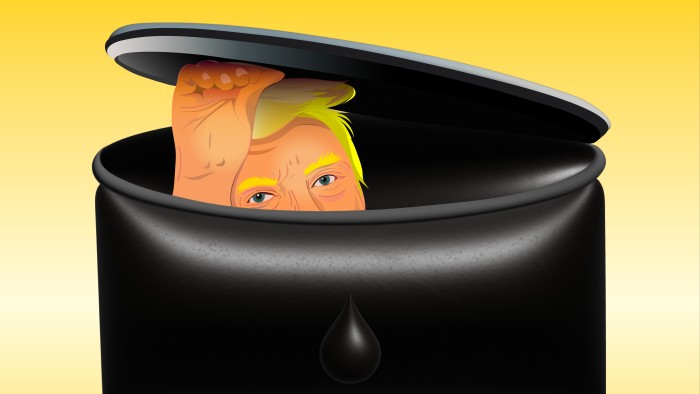Unlock the White House Watch newsletter for free
Your guide to what Trump’s second term means for Washington, business and the world
Almost 600 years ago, when the Ottomans conquered Constantinople, they learnt the danger of imperial over-reach.
In a bid to punish the European merchants they disliked, the Ottomans imposed fees and sanctions on traders using the famed Silk Road. The Portuguese duly responded by developing sea routes to Asia. The resulting struggle led to the long-term decline of the Silk Road; the power-grab backfired.
Is this now happening again? It is worth pondering. US President Donald Trump is not only unleashing wildly capricious tariffs (a word, incidentally, drawn from Arabic), he is also implementing sanctions.
This week alone, amid his whirlwind tour of the Middle East, Trump announced sanctions on Asian companies that move Iranian oil to China. He is also mulling fresh sanctions against Russia, following a move by Europe.
Trump is certainly not the first US president to do this: his predecessors have increasingly embraced the idea since 2001. But the White House appears doubly eager to wield these weapons now, not just around oil, but also sensitive technology such as chips, and finance (by cutting countries out of the Swift payment system). Or as Edward Fishman writes in a powerful new book Chokepoints: “Great powers once rose and survived by controlling geographic chokepoints like the Bosphorus. American power in the globalised economy relies on chokepoints of a different kind.”
However, there is a certain irony here: just as the Portuguese responded to Ottoman controls by developing alternative trading routes that undercut their power, Trump’s targets are now threatening to do the same — faster.
Consider oil.
Back in 2022, after Moscow’s brutal invasion of Ukraine, America and Europe put sanctions on Russia’s oil exports, hoping to hit its economy, just as earlier sanctions did with Iran. But western allies also feared that an outright ban would cause oil prices to soar. So they tried half measures: Russia was permitted to sell to non-western countries, but at sub-market prices, below $60 per barrel, with sanctions imposed on recalcitrants.
This inflicted some pain on Russia: fascinating economic research from the Dallas Federal Reserve suggests that when Russian exports were diverted to India, Russia had to “accept a $32 [per barrel] discount on its Urals crude in March 2023 relative to January 2022”, due to higher shipping costs, and India’s newfound bargaining power.
But this pain was ameliorated because Russia also started using “shadow fleets” to transport oil — tankers that avoid detection by switching off transceivers. And while such shadow fleets used to be small, they have now exploded in size, creating “a permanent parallel oil trading system beyond internationally recognised policies and controls,” according to a report from the Royal United Services Institute.
Indeed, one recent economic analysis that used machine learning models suggests that “between 2017 and 2023, dark ships transported an estimated 9.3mn metric tons of crude oil per month — nearly half of global seaborne crude exports.” China accounts for 15 per cent of the trade.
American officials are trying to fight back. Hence this week’s sanctions move against Hong Kong-based companies. But, as Agathe Demarais, of the European Council on Foreign Relations, notes in her book Backfire, past experience suggests that sanctions only truly work well when they are implemented swiftly, clearly targeted and — crucially — backed by allies.
It is not clear if Trump can deliver this. After all, his tariff policy has shattered the trust of allies. And efforts by the previous administration to curb tech exports to China partly backfired, since Beijing is developing its own tech and using third parties to smuggle in chips.
So too with finance: when America pushed Russia out of the Swift payment system, it “significantly reduced Russian trade with the firms in the west” but was “ineffective in reducing Russian trade with non-western countries,” according to an unpublished paper from economists at the Bank for International Settlements. That was because “the increasing use of partner currencies in Russia’s trade with developing countries has helped mitigate the effects of Swift sanctions”.
True to form, Trump has doubled down: he is threatening to impose 100 per cent tariffs against countries that develop non-dollar payment systems. Maybe that will work, given the dollar’s current dominance. But, to echo Demarais’ point, history shows that while sanctions can sometimes be effective, they must be used very decisively, with allies. Even then, they can produce unintended consequences.
So all eyes on Iranian oil. Trump may yet roll back his threats: oil prices fell on Wednesday when he said he was making progress in talks with Tehran. But if not, those shadow ships will be a good litmus test of whether Trump’s team really has as much power as it thinks. Time to (re)visit the Silk Road.
gillian.tett@ft.com


